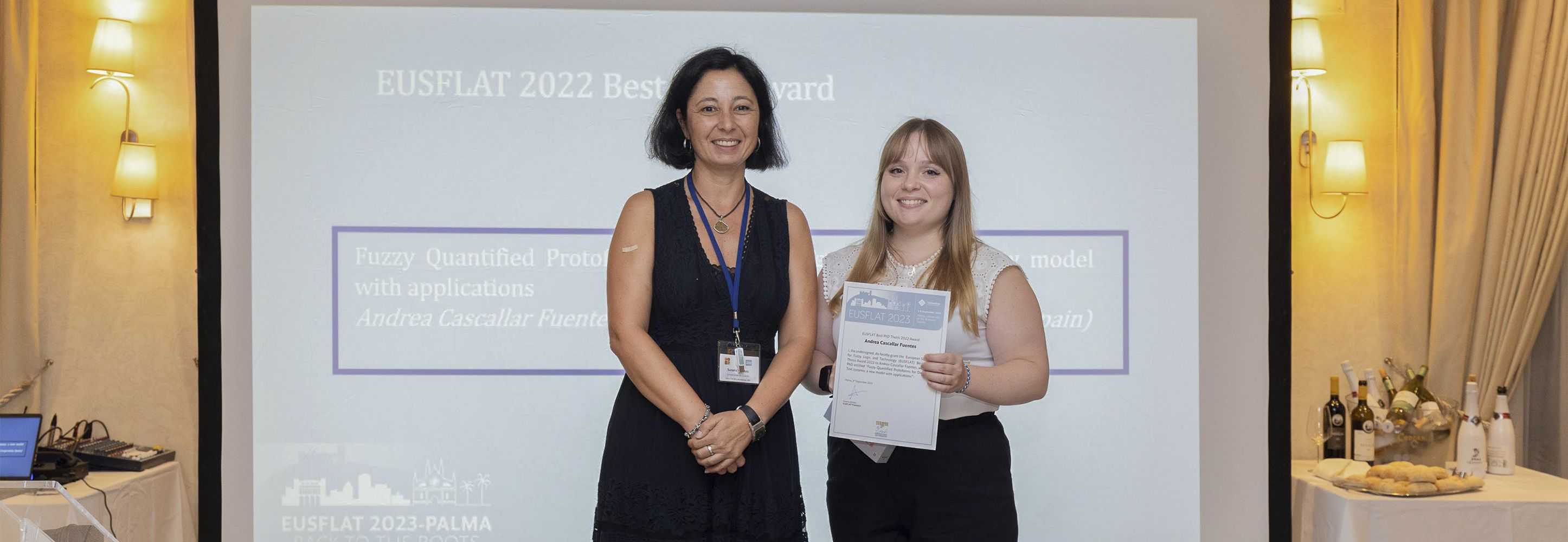
Andrea Cascallar Fuentes, EUSFLAT Best PhD Thesis European Award 2022 for her doctoral work at CiTIUS
The researcher collected the award during the annual meeting of the European Society for Fuzzy Logic and Technology, in recognition of the predoctoral work carried out entirely at USC’s research centre. It is the second time that this European Association has prized a CiTIUS thesis, after the award to Alejandro Ramos in 2016.
"Being the first Spanish woman awarded is, of course, a great source of pride for me, because it can serve as an inspiration for other girls to take the step of researching on the Artificial Intelligence field". The researcher **Andrea Cascallar Fuentes, who developed her PhD at CiTIUS, has been awarded the prize for the best thesis of the year at the European level, awarded annually by the European Society of Fuzzy Logic and Technology (EUSFLAT), which endorses the extraordinary work of the young scientist throughout her predoctoral stage, concluded in 2022 with the public defense of her work.
Likewise, it also represents recognition on the training work of CiTIUS, which for the second time celebrates the granting of this award to a graduated member (Dr. Alejandro Ramos, co-director of Andrea's thesis along with CiTIUS researcher Alberto Bugarín, won the same award in Warsaw in 2016).
In her work, Andrea Cascallar has addressed the scientific challenge of modelling imprecision in language, hybridising 'Fuzzy Quantified Protoforms' with 'Natural Language Generation' (NLG), and more specifically, with D2T or 'Data-To-Text' (Data-To-Text) systems. A key area of Artificial Intelligence (AI) that facilitates communication between humans and machines, by 'translating' the information contained in data (often unintelligible) into the natural language used by humans, which very often uses imprecise terms.
Linguistic, medical and environmental help
The thesis produced several results of impact: firstly, the authorship of the 'SimpleNLG-GL' linguistic realisation library, which facilitates the generation of natural language texts in Galician, should be highlighted. SimpleNLG-GL is an adaptation of the original SimpleNLG library, developed in English, whose construction required the design and implementation of the morphosyntactic rules of Galician. Thus, this contribution has a triple value: on the one hand, it is a contribution both to society and to the scientific community, since its use is of public access; on the other hand, it constitutes a very important technological advance for the development of the field of Natural Language Generation in Galician, since until now there was no similar one for this language.
Furthermore, an important part of the thesis was also dedicated to building several D2T systems for real use, in two main domains: on the one hand, cardiovascular health, a field to which contributions weretextual descriptions of variables and data of interest to facilitate patient monitoring by medical personnel, such as blood pressure, physical activity, or body mass index (BMI); the second domain of application is environmental information systems, an area in which the thesis resulted in the ICA2Text system to provide textual information on the Air Quality Index, a system that ended up being deployed as a true public service. Since its implementation on September 30, 2022, ICA2Text has provided textual information to the approximately 30,000 visitors to the official website of the *Galician **Air Quality **Network *.
First in 12 years
Andrea Cascallar thus becomes the first woman born in Spain to win the EUSFLAT Best PhD Thesis Awardsince its first edition in 2010, a distinction that only three other women in Europe had received until now. However, the former CiTIUS doctoral student is convinced that the ratio between men and women will become more and more balanced: "I am sure that in the future many other women will be awarded this prize, because fortunately it seems that more and more female students are encouraged to take technological studies." And she concludes by sending a message to the youngest students: "I would tell a girl who is now a degree student that, if she is curious and interested in facing new challenges that are useful for society and improving people's lives, research could be a very interesting option for her. This is not just about developing the technological part, but also about acquiring skills and working on many different aspects... it is a very rewarding experience".